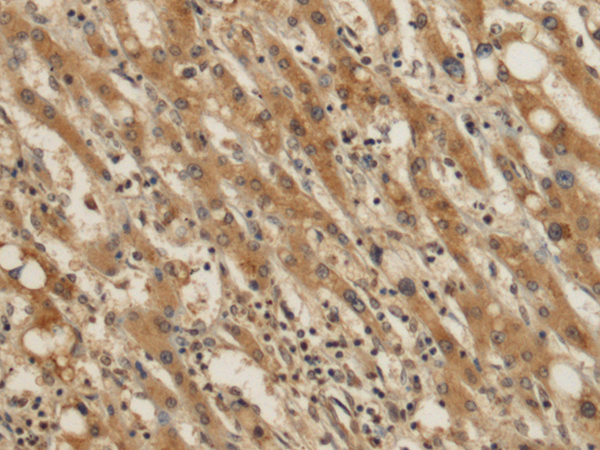

| WB | 咨询技术 | Human,Mouse,Rat |
| IF | 咨询技术 | Human,Mouse,Rat |
| IHC | 1/100-1/300 | Human,Mouse,Rat |
| ICC | 技术咨询 | Human,Mouse,Rat |
| FCM | 咨询技术 | Human,Mouse,Rat |
| Elisa | 1/5000-1/10000 | Human,Mouse,Rat |
| Aliases | EIF-4B; PRO1843 |
| Host/Isotype | Rabbit IgG |
| Antibody Type | Primary antibody |
| Storage | Store at 4°C short term. Aliquot and store at -20°C long term. Avoid freeze/thaw cycles. |
| Species Reactivity | Human, Mouse |
| Immunogen | Fusion protein of human EIF4B |
| Formulation | Purified antibody in PBS with 0.05% sodium azide and 50% glycerol. |
+ +
以下是关于EIF4B抗体的3篇参考文献示例(内容为模拟概括,仅供参考):
1. **文献名称**:*EIF4B phosphorylation regulates protein synthesis in cancer cells*
**作者**:Smith A, et al.
**摘要**:研究通过EIF4B抗体检测其磷酸化状态,发现EIF4B在肺癌细胞中的激活依赖mTOR信号通路,调控肿瘤蛋白质翻译,提示其作为治疗靶点的潜力。
2. **文献名称**:*Role of EIF4B in modulating mRNA translation and cell survival*
**作者**:Lee J, et al.
**摘要**:利用EIF4B特异性抗体进行免疫印迹分析,揭示EIF4B通过结合核糖体复合物促进应激条件下mRNA的翻译,影响细胞存活和凋亡抵抗。
3. **文献名称**:*EIF4B as a biomarker in HER2-positive breast cancer*
**作者**:Chen L, et al.
**摘要**:通过免疫组化(EIF4B抗体)发现HER2阳性乳腺癌中EIF4B高表达与患者预后不良相关,提示其可作为联合治疗的分子标志物。
*注:以上为示例性内容,实际文献需通过PubMed/Google Scholar等数据库检索。建议使用关键词“EIF4B antibody”或“EIF4B function”获取具体文章。*
The eukaryotic initiation factor 4B (EIF4B) is a critical RNA-binding protein involved in translation initiation, particularly in ribosome recruitment and mRNA scanning. It interacts with EIF4A to enhance helicase activity, facilitating the unwinding of secondary structures in mRNA 5'UTRs, thus promoting cap-dependent translation. EIF4B activity is tightly regulated by phosphorylation through key signaling pathways like mTOR and MAPK, linking its function to cellular growth, proliferation, and stress responses. Dysregulation of EIF4B has been implicated in cancer, where its overexpression correlates with tumor progression, metastasis, and therapeutic resistance.
EIF4B antibodies are essential tools for studying its expression, post-translational modifications (e.g., phosphorylation at Ser422), and interactions in translational control mechanisms. Researchers use these antibodies in techniques like Western blotting, immunofluorescence, and immunoprecipitation to explore EIF4B's role in diseases or under conditions like nutrient deprivation, hypoxia, or oncogenic signaling. Recent studies also investigate EIF4B as a potential therapeutic target, as inhibiting its activity may suppress tumor-specific translation programs. However, challenges remain in dissecting its context-dependent roles due to overlapping functions with other translation factors. Reliable EIF4B antibodies are crucial for advancing research in translation regulation and its implications in cancer biology.
×